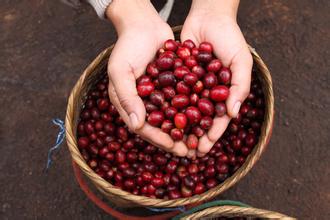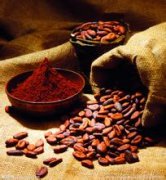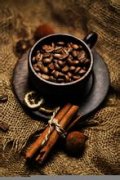Panamanian coffee is inseparable from the unique Hartmont Manor.

Bordering Costa Rica and Colombia, Panama's east-west environment allows cold air to flow through the Central Mountains at more than 6500 feet, creating a very unique microclimate in the Boquete and Vol á n Candela regions, making it a major producer of Panamanian coffee. The land around this area is rich in nutrients, and these fertile soils provide perfect conditions for the growth of coffee, creating a large number of unique, high-quality coffee.
There should be no objection to describe Panamanian coffee as unique. This small country has the most competitive coffee farm in the world and the highest average transaction price. The important reason for the unique quality of Panamanian coffee is its microclimate.
Here is a coffee farm worth introducing to you. It is the century-old Finca Hartmann.
Mr. Luis Hartmann, the founder of Hartman Manor, which is owned by the Hartman family, is a legendary figure. Mr. Hartman was born in the Moravilla region of Austria and Hungary on June 20, 1891, which is now the Czech Republic. Both of his brothers died in World War I, but he survived thanks to his mother hiding on a ship bound for Pennsylvania. In 1907, young Hartmond traveled many countries with his friends on the road, until he came to Panama in 1911, but he did not choose to develop in Panama. After thinking about the future, in 1912 he chose Chiriki and settled down, mainly in the Kendra region, where he was the first generation of residents. He married his first wife Suzanne in 1918 and welcomed their first child, Ratibor Hartmann, who later founded Finca Hartmann, in 1920.
Mr. Louis Hartmont lived in Volcan, La Silla de Pando and Santa Clara3, and grew coffee everywhere he went. He named his first coffee farm "Tizingal", which means "my Star". In addition to coffee, Mr. Hartmond was extremely keen on exploring monuments all his life. Based on his contribution to Panamanian archaeology, he was awarded the title of "Daniel Boone of Panama" by National Geographic magazine in 1950. He died on May 25, 1970.
Today's Hartmont is a family business run by Latibor and the five children of his wife, Dinola Sandy, who now own two coffee farms, Ojo de Agua and Palo Verde, which are about two miles apart, with each family member responsible for coffee growth management, harvesting and farm visits.
Ojo de Agua's coffee is planted under shade trees, and many areas of the estate are virgin forests. It is also one of the mitigation areas across the famous La Amistad Forest Reserve in Costa Rica and Panama, with an average elevation drop of between 1220 and 1828 meters. The mud road in the manor leads to various native habitats of animals and plants, making it ideal for bird watching, hiking and exploration.
Both Ojo de Agua and Palo Verde offer small while both Ojo de Agua and Palo Verde provide small
Palo Verde Farm is known as Hartmont Manor, where coffee is also grown under rainforest shade trees, with an average elevation of 1250 meters, an average annual temperature of between 12.7 and 26.6 degrees, an annual rainfall of 4500 millimeters, a wide range of paths and dirt roads, and a small museum with insect specimens and local indigenous artifacts.
Their efforts to protect the environment are appreciated by the scientific community, and we can see that the core symbol of the manor is an eye-catching giant beaked bird (Toucan).
Hartmont Manor has a wide variety of coffee, including Typica, Kaddura, Catuai, Bourb ó n, Pacamara, Maragogipe and Geisha. People grow coffee here in accordance with the requirements of green environmental protection, and the farm compost is made of pulp and cherry skins. The treatment methods used are not only the traditional manual methods, such as solarization, honey treatment, but also the recent rapid development of red wine treatment and so on.
Traditional sun and honey treatments and compost made from the skins of pulp and coffee cherries
The family business has a state cup testing laboratory and a sample baking room. Test each batch of coffee fruit with a rigorous attitude and strict standard cups. This ensures that the coffee quality at Hartman Manor is stable and is always looking for progress. Their scientific attitude towards coffee and nearly 100 years of family experience ensure that they produce excellent products, and a family farm that has grown coffee for more than 100 years is itself a legend.
Important Notice :
前街咖啡 FrontStreet Coffee has moved to new addredd:
FrontStreet Coffee Address: 315,Donghua East Road,GuangZhou
Tel:020 38364473
- Prev

Brief introduction of Panamanian Flower Butterfly Coffee Bean hand-made method for Baking Taste and Flavor
There are many ways of washing, but generally speaking, the floating beans are removed after the coffee fruit is picked, then the pulp is removed, and then the coffee beans are soaked in a fermentation trough. The enzymes in the water will soften the mucus attached to the peel of the coffee beans. Natural yeast will break down the sugar in the mucus, a process called fermentation. After the fermentation is finished, move the coffee beans to the sun field to dry and dry.
- Next

A brief introduction to the characteristics of Bourbon pointed Coffee Bean Flavor Grinding scale
Kenya "SL28" and "SL24" were screened by French and British missionaries and researchers in Kenya at the beginning of the 20th century.
Related
- Detailed explanation of Jadeite planting Land in Panamanian Jadeite Manor introduction to the grading system of Jadeite competitive bidding, Red bid, Green bid and Rose Summer
- Story of Coffee planting in Brenka region of Costa Rica Stonehenge Manor anaerobic heavy honey treatment of flavor mouth
- What's on the barrel of Blue Mountain Coffee beans?
- Can American coffee also pull flowers? How to use hot American style to pull out a good-looking pattern?
- Can you make a cold extract with coffee beans? What is the right proportion for cold-extracted coffee formula?
- Indonesian PWN Gold Mandrine Coffee Origin Features Flavor How to Chong? Mandolin coffee is American.
- A brief introduction to the flavor characteristics of Brazilian yellow bourbon coffee beans
- What is the effect of different water quality on the flavor of cold-extracted coffee? What kind of water is best for brewing coffee?
- Why do you think of Rose Summer whenever you mention Panamanian coffee?
- Introduction to the characteristics of authentic blue mountain coffee bean producing areas? What is the CIB Coffee Authority in Jamaica?

